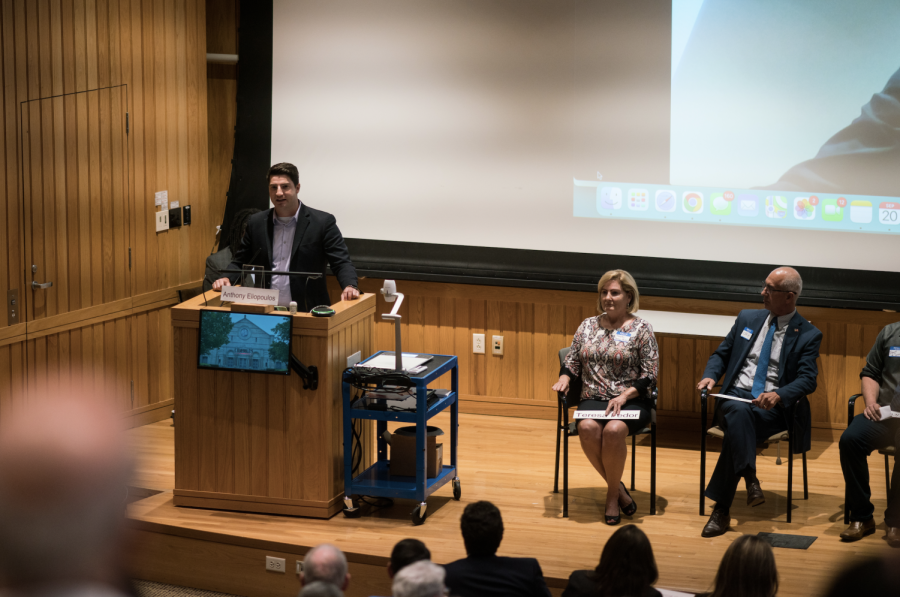Midterm Election Candidates Speak to Oberlin College, Community
Last Tuesday night, candidates spoke to students and community members about their platforms and positions on a variety of issues.
The annual Oberlin Community Candidates Night was held this past Tuesday evening in Dye Lecture Hall. OCCN is an opportunity for individuals running for federal, state, and local office in the midterm elections to introduce themselves to Oberlin voters and answer their questions. This year was the first in its 30-year history that OCCN was held on campus and planned in collaboration with Oberlin College Students for Civic Engagement.
The OCCN Planning Committee was co-chaired by Alison Ricker, head of the Science Library and member of the League of Women Voters, and College third-year Myranda Montoye, convenor of Oberlin SCE. The event was moderated by Chair and Associate Professor of Africana Studies Charles Peterson and timed to coincide with National Voter Registration Day. The Planning Committee worked with a coalition of 15 local organizations to host the event.
In the past, OCCN has been held at the Mount Zion Baptist Church of Oberlin, although organizers have experimented with venues and structure. This year, Ricker hoped the change of venue would lead to more student participation.
“Hopefully, there will be a lot of people there who are interested in asking questions, and they will be questions that reflect the concerns of people who are 18 to 22 years old,” Ricker said.
This past summer, Montoye independently arrived at the idea of a candidates night, not knowing the event was already an annual tradition.
“Over the summer, I wanted to be very careful because I knew that there were already a lot of people — community members — that were doing this kind of work already,” Montoye said. “And so I spent a lot of the summer connecting with those people and learning about what infrastructure there already was for voter registration and other civic engagement in the community, and then learned about OCCN. I was like, ‘Oh, perfect! We already have this event.’”
While Candidates Night was designated as a nonpartisan community forum, the event featured 14 Democratic and two Republican candidates, though others were invited. The unequal representation of political parties would normally activate the LWV Empty Chair Policy. The Empty Chair Policy dictates that when multiple candidates are running for the same federal seat but only one appears at a LWV debate, the candidate that is present may not answer questions without their opposition present. If this policy had been implemented, the skewed party representation would have meant that Democratic candidates running for U.S. Congress would have been barred from participating in the question and answer segment of the event. As a nonprofit, LWV could be held liable for not abiding by this policy. For this reason, OCCN organizers excluded the LWV from its official list of collaborators — meaning the organizers didn’t need to abide by the Empty Chair Policy.
“It is not unique to our event — other events around the state and around the country have also reported a lack of interest or response from Republican candidates,” Ricker said. “I can’t assume that there’s anything behind that other than, maybe they just don’t feel it’s worth their time. Maybe they are in gerrymandered districts where they don’t feel they really need to reach out to people, because they’re in a safe seat.”
The Republican-controlled Ohio Redistricting Commission redrew its congressional district maps earlier this year. However, the new maps — and their two subsequent revisions — were ruled unconstitutional by the Ohio Supreme Court for violating a 2018 amendment prohibiting partisan gerrymandering. The resulting confusion compelled Ohio election officials to hold two separate primaries.
“Gerrymandering is just a vile thing for democracy,” Ricker said. “If you’re in a safe seat, you’re not feeling pressured to respond to the needs of all constituents, maybe just those that donate to you. [You may] happen to be a lower-income constituent and you’re putting pressure on lenders, but the lenders aren’t putting that pressure on the elected official, because they’re all comfortable with how the status quo is.”
Ricker also mentioned that Republican candidates may feel their participation in a forum held in Oberlin would not garner them any votes and ultimately prove futile, considering the City’s solid Democratic lean.
Montoye, however, was encouraged by responses the OCCN planning committee received from candidates, even those who declined to attend.
“We talked to the current [Ohio] attorney general, and I talked to his scheduler on the phone,” Montoye said. “He said that they had already committed to an event in Toledo that night, but he had stressed that he thought this was a really, really important event and wanted to be there, and just couldn’t make it happen. I do think it was a well-received invitation.”





